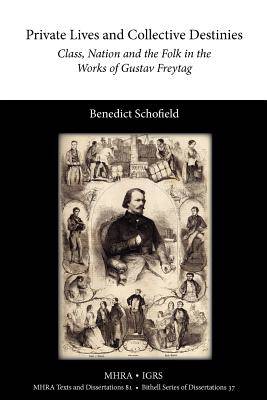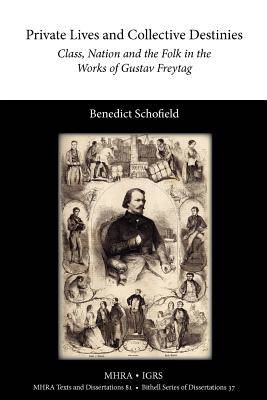
- Afhalen na 1 uur in een winkel met voorraad
- Gratis thuislevering in België vanaf € 30
- Ruim aanbod met 7 miljoen producten
- Afhalen na 1 uur in een winkel met voorraad
- Gratis thuislevering in België vanaf € 30
- Ruim aanbod met 7 miljoen producten
Zoeken
Private Lives and Collective Destinies
Class, Nation and the Folk in the Works of Gustav Freytag (1816-1895)
Benedict Schofield
€ 20,95
+ 41 punten
Uitvoering
Omschrijving
Nineteenth-century Germany witnessed many debates on the nature of the nation, both before and after unification in 1871. Bourgeois authors engaged closely with questions of class and national identity, and resourcefully sought to influence the collective destiny of the German people through works of popular fiction and cultural history. Typical of this trend was the realist writer Gustav Freytag (1816-1895), the most widely read novelist of his era. Innovatively exploring all of Freytag's works (poetry, drama, novels, history, journalism, biography and literary theory), Schofield examines how his popular writing systematically re-imagined the social structures of German society, embedding political agendas within contemporary stories of private lives. Connecting the aesthetics of Realism with the political aims of the bourgeoisie, the study both reassesses Freytag's position within the German literary canon and re-evaluates received opinion on the socio-political function of Realism in German culture. Benedict Schofield is Lecturer in German at King's College London.
Specificaties
Betrokkenen
- Auteur(s):
- Uitgeverij:
Inhoud
- Aantal bladzijden:
- 228
- Taal:
- Engels
- Reeks:
Eigenschappen
- Productcode (EAN):
- 9781907322990
- Verschijningsdatum:
- 16/04/2012
- Uitvoering:
- Paperback
- Formaat:
- Trade paperback (VS)
- Afmetingen:
- 156 mm x 234 mm
- Gewicht:
- 326 g

Alleen bij Standaard Boekhandel
+ 41 punten op je klantenkaart van Standaard Boekhandel
Beoordelingen
We publiceren alleen reviews die voldoen aan de voorwaarden voor reviews. Bekijk onze voorwaarden voor reviews.











